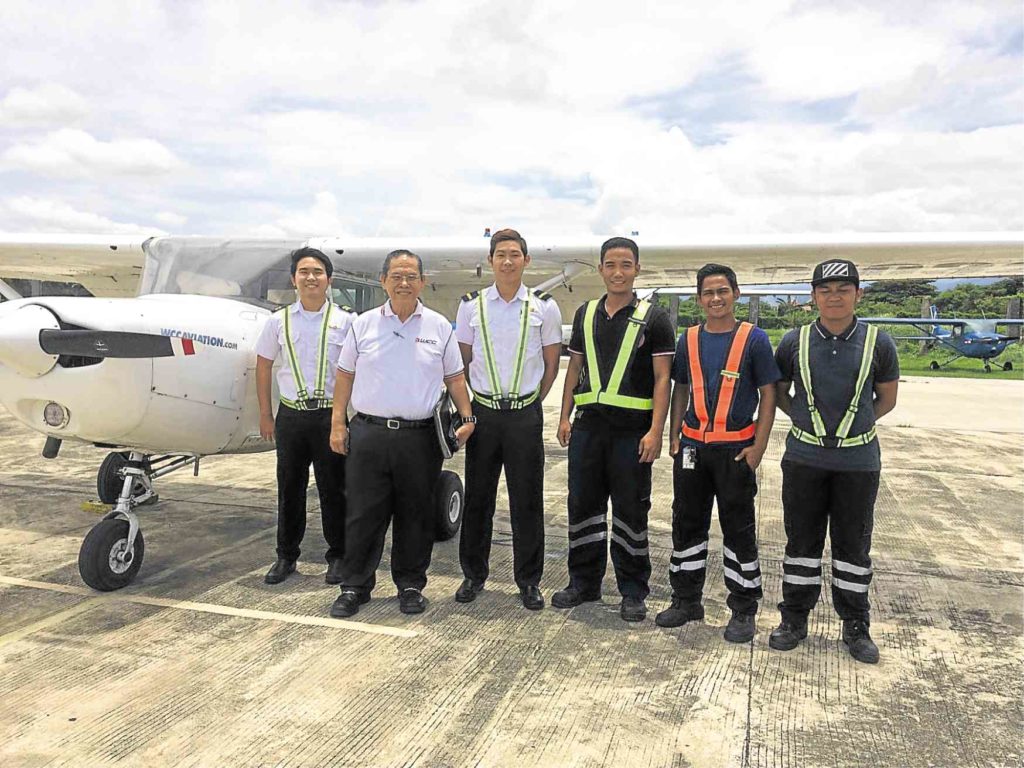Ex-PAL CEO finds new career in teaching

Zapanta poses with pilot and aeronautical maintenance students of WCC Aeronautical and Technological College (WATC)
BINALONAN, PANGASINAN —Former Philippine Airlines president Avelino Zapanta has found a new career developing new pilots to contribute to the country’s push to become one of Asia’s next aviation powerhouses.
Zapanta has joined the WCC Aeronautical and Technological College (WATC) in this agricultural town in eastern Pangasinan, bringing with him his vast leadership experience and knowledge and a sterling reputation in the field of aviation.
He served as president and chief operating officer of PAL, the country’s flagship carrier, from 1999 to 2004.
Zapanta, who holds a doctoral degree in aeronautical management, heads WCC’s airline business management and development unit, where he is developing the curriculum for a bachelor of science degree in aviation business management.
“We have excellent prospects because of the liberalization of the industry, open skies and the Asean open market. Sustained with the country’s economic growth, the local aviation industry will soar,” he says.
“We have survived economic challenges throughout the years, including the fuel crisis of 2008 which hit the industry really hard, with airlines suffering. But the local carriers forged on, with new players entering the picture and there were mergers and acquisitions as well,” he adds.
The local aviation sector remains “very healthy,” Zapanta says, because “the fuel price decline in 2015-2016 was a tremendous boost to the carriers as fuel comprises the biggest operating expense for airline operators, although there is no certainty that the low fuel prices will continue.”
“The last two years have been steady, this is the third year that we are enjoying good fuel prices,” he says, adding that with the fuel cost down almost 20 percent, the carriers were able to expand.
“When the economy is down, passenger traffic is also down. When it is up, so is the airline industry,” he says.
But Zapanta says the low fuel cost may not last as “there are indications that fuel producers will resume their practice of closing and opening valves of fuel supply to play with fuel price.”
But the prevailing trend has been rosy for carriers like PAL and Cebu Pacific which have aircraft orders, with PAL opening up more points to Europe, specifically London, Amsterdam, Paris and Rome.
“Cebu Pacific’s A350 being a long-haul aircraft, [the airline company] may have plans to open more regional points. Maybe they will fly to the United States mainland as it is already operating in Guam. And that’s good news to the airline riding public,” Zapanta says.
He cites the need to open the Clark International Airport in Pampanga to more international flights, as the Ninoy Aquino International Airport could no longer cope with the burgeoning number of carriers and passengers.
But because of the aviation boom, the industry has started to feel the shortage of mission-critical professionals such as pilots and mechanics. They are are so important, he says, that the airlines cannot operate without them.
“We have a shortage because they are being pirated by foreign airlines and big maintenance and repair companies,” he says.
Zapanta knows the industry well.
Zapanta rose from the ranks of PAL, starting as a cargo clerk in 1966.
He was credited for halting the downward spiral of Asia’s first airline and helping it become competitive again.
He later joined Southeast Asian Airlines (Seair) and was instrumental in the expansion of its operations from an all-turbo prop airline flying domestic routes to a regional one operating Airbus 320s.
He aims to bring the experience of growing and operating airlines to his new job.
WATC’s new program, Zapanta says, will address the needs of the industry’s producers (aircraft manufacturers, airlines, government, airports and aviation services that include fuel suppliers and spare parts dealers), and consumers (passengers and cargo shippers).
At present, the college’s curricular programs focus on the training of pilots, aircraft engineers and technicians, and cabin crew.
WCC president and CEO Ramon Guico III says, “We were looking forward to a full-blown aviation industry, but we did not expect the growth to be at this pace” when the school was established in 2005.
But WCC is ready to step up its pace. The demand for professionals is there and WCC wants to be the one to meet it, with the help of Zapanta.
